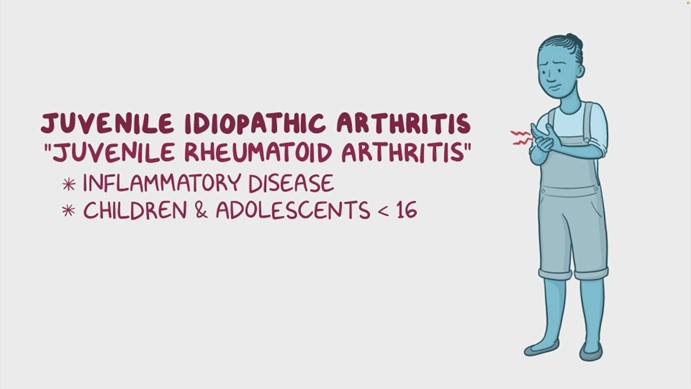A nurse is providing discharge instructions to a parent and his school-age child who has juvenile idiopathic arthritis. Which of the following instructions should the nurse include?
Apply cool compresses for 20 min every hour.
Encourage the child to take a 45-minute nap daily.
Allow the child to stay at home on days when her joints are painful.
Administer prednisone on an alternate-day schedule.
The Correct Answer is D
Choice A reason: wrong because applying cool compresses for 20 minutes every hour is not typically recommended. While cool compresses can help reduce joint swelling and pain, they are usually recommended to be applied for short periods and not as frequently as every hour
Choice B reason: wrong because while rest is important, there is no specific recommendation for a 45-minute nap daily. Adequate rest should be balanced with physical activity, which is essential for maintaining joint function and muscle strength
Choice C reason: wrong because allowing the child to stay at home on days when her joints are painful may lead to prolonged inactivity, which can worsen joint stiffness and reduce muscle strength. It’s important to encourage regular movement and activity as tolerated
Choice D reason: This is correct because prednisone is a corticosteroid used to reduce inflammation in conditions like juvenile idiopathic arthritis, and an alternate-day schedule can be effective in managing symptoms while minimizing side effects

Nursing Test Bank
Naxlex Comprehensive Predictor Exams
Related Questions
Correct Answer is B
Explanation
Choice A: This statement is correct, as the mother should notify the doctor if the child's temperature is not controlled with acetaminophen, which is an antipyretic and analgesic medication that can lower fever and relieve pain. A high fever can increase the child's metabolic rate and insulin requirements, which can lead to hyperglycemia or ketoacidosis.
Choice B: This statement is incorrect, as the mother should check the child's blood sugar more frequently than two times every day, especially when the child is sick. An upper respiratory infection can cause inflammation and stress hormones, which can increase the child's blood sugar levels and insulin needs. The mother should monitor the child's blood sugar at least four times a day or more often if indicated by symptoms or ketone testing.
Choice C: This statement is correct, as the mother should encourage the child to drink half a cup of water or sugar-free fluids every 30 minutes, which can prevent dehydration and flush out excess glucose and ketones from the body. Dehydration can worsen hyperglycemia and ketoacidosis, which are serious complications of diabetes.
Choice D: This statement is correct, as the mother should report a change in the child's breathing or any signs of confusion, which can indicate respiratory distress or cerebral edema. Respiratory distress can occur due to hypoxia or acidosis, which can impair oxygen delivery and carbon dioxide elimination. Cerebral edema can occur due to fluid shifts or electrolyte imbalances, which can cause increased intracranial pressure and neurological impairment.
Correct Answer is B
Explanation
Choice A reason: This choice is incorrect because taking glyburide with breakfast is not recommended for an adolescent who has type 1 diabetes mellitus. Glyburide is an oral hypoglycemic medication that lowers blood glucose levels by stimulating insulin secretion from the pancreas. It may be used for clients who have type 2 diabetes mellitus, but it does not work for clients who have type 1 diabetes mellitus or DKA.
Choice B reason: This choice is correct because obtaining an influenza vaccine annually is recommended for an adolescent who has type 1 diabetes mellitus. The influenza vaccine is a vaccine that protects against influenza, a viral infection that affects the respiratory system. It may prevent or reduce the severity of influenza and its complications, such as pneumonia or sepsis. It is recommended for everyone who is 6 months or older, especially those who have chronic conditions such as diabetes mellitus that increase their risk of influenza-related complications.
Choice C reason: This choice is incorrect because administering glucagon for hyperglycemia is not indicated for an adolescent who has type 1 diabetes mellitus. Glucagon is a hormone that raises blood glucose levels by stimulating glycogen breakdown in the liver. It may be used for clients who have hypoglycemia, which is a condition in which blood glucose levels are lower than normal (less than 70 mg/dL). It may cause symptoms such as sweating, trembling, confusion, or loss of consciousness. However, in type 1 diabetes mellitus, hyperglycemia (high blood glucose levels) rather than hypoglycemia is more likely to occur due to insulin deficiency or resistance.
Choice D reason: This choice is incorrect because injecting insulin in the deltoid muscle is not an optimal method for an adolescent who has type 1 diabetes mellitus. Insulin is a hormone that lowers blood glucose levels by facilitating glucose uptake into the cells. It may be administered by injection or infusion, and it may vary in onset, peak, and duration of action. The preferred sites for insulin injection are the abdomen, the thighs, the buttocks, or the upper arms, as they have more subcutaneous fat and less muscle tissue. Injecting insulin into the deltoid muscle may cause faster absorption and shorter duration of action, which can affect blood glucose control and increase the risk of hypoglycemia.

Whether you are a student looking to ace your exams or a practicing nurse seeking to enhance your expertise , our nursing education contents will empower you with the confidence and competence to make a difference in the lives of patients and become a respected leader in the healthcare field.
Visit Naxlex, invest in your future and unlock endless possibilities with our unparalleled nursing education contents today
Report Wrong Answer on the Current Question
Do you disagree with the answer? If yes, what is your expected answer? Explain.
Kindly be descriptive with the issue you are facing.
